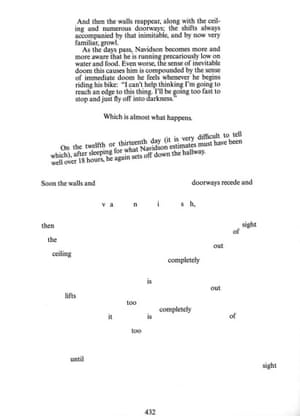 |
| ‘House of Leaves is a kid. I’m that kid’s dad’ ... Mark Z Danielewski. Photograph: Ulf Andersen |
Horror books
Ten Haunted House Stories
'House of Leaves changed my life': the cult novel at 20
Andrew Lloyd
Thu 2 Apr 2020 14.04 BST
T
When a mysterious doorway appears, leading to a maze of smooth, ash-grey walls, Will Navidson – the house’s owner, a Pulitzer prize-winning photojournalist – goes in to investigate. The Navidson Record, his film of these explorations, becomes the intense focus of a blind man called Zampanò, who writes about the footage with lengthy, academic precision. When Zampanò is found dead in his apartment, troubled tattoo artist Johnny Truant discovers his notes and inherits the fixation. As Truant becomes increasingly obsessed with the story, so too does the reader.
Two decades on, Danielewski sees his relationship with his first book as that of a slightly distant parent. “Look at it this way,” he says, “House of Leaves is a kid. I’m that kid’s dad. By now my kid has made a lot of friends, forged close ties, has a multitude of personal relationships I know nothing about. Now and then, my kid’s friends think it’s cool to meet the dad, but they don’t want the dad hanging around for too long, they’re not friends with the dad, they’re friends with my kid.”
Dreebs Thornhill is a moderator of the House of Leaves book club, a Facebook group with more than 7,000 members and counting. She agrees with Danielewski’s personification. “House of Leaves is a living, breathing thing,” she says. “It’s one of those things you can’t relax with until you’ve discussed it with someone else.”
The thousands of readers in the group have bonded over the mysteries in the book; and new readers continue to join, often in search of guidance. “It’s become a tight family that are dedicated to each other,” Thornhill says. “A lot of them saw the group as a window in a dark room. House of Leaves doesn’t just connect with people, but actually connects people. The impact has been greatly meaningful.”
Benjamin Muir, a doctoral candidate at Western Sydney University can attest to this impact. He says the book irrevocably changed the course of his life. He was particularly struck by how it dealt with loss – a topic he explores in his thesis: “We all Create Stories to Protect Ourselves”: Trauma, Grief and Letting go in Mark Z Danielewski’s House of Leaves.
“I’ve felt a lot of the critical work on [the book] has been a little blinkered, or perhaps myopic in its focus on the typographical experiments and oddities rather than the themes,” he says. “Trauma and grief are two of the foremost themes.”
Before House of Leaves, Muir was – in his own words – flunking his first year at university, smoking too much weed and dealing with personal trauma that he couldn’t process. “House of Leaves changed everything. It taught me what it meant to let go,” he says. “I learned the book had originally grown from a piece of writing Mark undertook while dealing with his father being on his deathbed. I began to understand it a lot better and see how the act of writing the book is almost like a kind of pay-it-forward to the reader, to be able to overcome that grief.”

Anecdotally, young men hold a particular reverence for the novel – perhaps for this reason. “I think Danielewski wrote this for everyone, but I think a lot of men who weren’t necessarily raised with the same toolset with regards to emotional intelligence many women have should be able to find something valuable there, in terms of dealing with their grief and trauma,” says Muir.In part, House of Leaves is also about obsession, a trait it demands from its readers; to simply finish the book, with its deliberately complex structure, is an act of dedication – for some more than others.
“I would describe [myself as] totally blind,” says Timothy Peters, a fan of the book who has a genetic eye condition called Leber congenital amaurosis. Due to its structure, House of Leaves doesn’t work well as an audiobook, but Peters listened to a bootleg version on YouTube before he discovered a braille copy around 1,400 pages long.
“When I like something, I get a tiny bit obsessed,” he says. “I think the concept of mazes and labyrinths is thematically important to me as a blind individual who has once or twice got lost in my own neighbourhood.”
Peters had no idea there was a blind character in House of Leaves before he started it, and says the book’s use of sound, rather than visual descriptions, made it a unique reading experience for him. “We always read about visual descriptions of characters, places and objects, but what literature does not understand is, though sight is an important sense, it is one of five,” he says.
Over the last 20 years, House of Leaves has continued to reward readers prepared to navigate its labyrinth, with a community of fans ready to support them if they ever get lost in the dark. Even Danielewski has re-entered the maze recently, reading his debut cover to cover. “I was proud, humbled, astonished, unsettled,” he says. “At the end, I sobbed.”


No comments:
Post a Comment